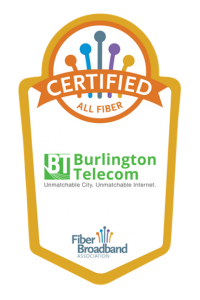Burlington Telecom Scores Big on Survey, Fiber Certification
Burlington Telecom (BT), the Fiber-to-the-Home (FTTH) ISP in Burlington, Vermont, has been celebrating two pieces of recent good news. The ISP received praise from customers in a BT survey, and became the first fiber provider in its region to be “fiber certified.”
BT has had some bumps in the road as it transitions from a municipally run ISP to a private sector one. The change didn’t stop the telecom, however, from continuing to receive good feedback from the annual customer survey. Overall, 90 percent of BT customers said they were at least “satisfied” with their service, and 70 percent of those said they were “very satisfied.” BT also saw a 5 percentage point increase in customer satisfaction with the quality of customer service, to 77 percent.
The accolades don’t stop there. Fiber Broadband Association (FBA) awards All-Fiber Certifications to those networks providing at least 90 percent fiber optic connectivity to subscribing residences. BT boasts 100 percent fiber, making it the first ISP in New England to receive the FBA certification. The All-Fiber certification not only recognizes majority-fiber networks, but also high level strategy in deployment of that fiber, and a commitment of the networks to bring the highest quality connectivity to its customers.
 The Future of the Promising Network
The Future of the Promising Network
Burlington Telecom began as a municipally-run network. However, due to mismanagement of funds on the part of the city, BT had to reach a deal with investors to settle a debt issue, contingent upon the city selling the telecom to a private entity. Back when the financial mismanagement came to light and the future of the municipal telecom first got on shaky ground, Community Networks wrote a case study of the rise and fall of Burlington Telecom.



